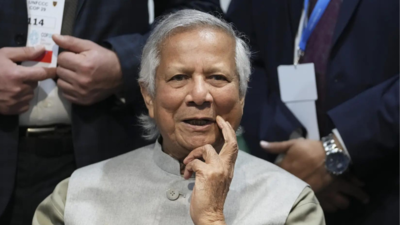
Bangladesh's interim government chief, Muhammad Yunus, has urged national unity in the face of what he described as a coordinated "campaign" by "big countries" to undermine the legitimacy of the uprising that brought his administration to power.
Speaking on Wednesday to representatives of political parties, Yunus stopped short of naming any specific country but addressed escalating tensions, particularly with India.
Without directly naming India, Yunus referred to "big countries" allegedly involved in spreading misinformation about the new government.
"Many are not liking our freedom, the (new) independence, desperate efforts are being made to upset it," Yunus told leaders representing several political parties, including ex-prime minister Khaleda Zia's BNP, Jamaat-e-Islami and left-leaning groups.
During the meeting, Yunus sought political leaders' input on three critical issues: alleged propaganda against Bangladesh in India and other parts of the world, an attack on the Bangladeshi mission in Agartala, and accusations of minority persecution within the country.
Yunus criticized what he referred to as attempts to portray the July-August uprising, which led to the ousting of Sheikh Hasina as prime minister, as a destabilising event. “The quarters who did not like the uprising are trying to depict it domestically and internationally as something dangerous,” he said.
In remarks captured in video footage released by his office, Yunus called for collective action to counter the narrative. “We have to tell the entire world that we are one. We achieved this together. This has now become a matter of our existence,” he said.
The interim leader’s remarks came against a backdrop of strained ties with India, heightened by allegations of violence against minorities and the recent attack on the Bangladeshi mission in Agartala.
In first public address, Hasina accuses Yunus of 'genocide', persecuting minorities
Ousted Bangladeshi Prime Minister Sheikh Hasina accused country's interim leader Muhammad Yunus of failing to safeguard minority communities and perpetrating what she described as "genocide."
In her first public address since resigning in August amidst widespread anti-government protests, Hasina, speaking virtually at an event in New York, alleged targeted attacks on religious minorities, including Hindus, Buddhists, and Christians.
Speaking at an event marking Bangladesh's Vijay Diwas, the Awami League leader highlighted the worsening plight of minorities under the current regime. "What is this persecution of minorities for? Why are they being ruthlessly attacked?" she questioned.
She also claimed there was a plot to assassinate her and her sister Sheikh Rehana, mirroring the tragic fate of their father, Sheikh Mujibur Rahman, who was assassinated in 1975.
Referring to her ouster and the violent storming of her official residence, Ganabhaban, on August 5, Hasina said, “The armed protestors were directed toward Ganabhaban. If the security guards had opened fire, many lives would have been lost. I was forced to leave, and I told them not to fire no matter what happened.”
Hasina, speaking in Bengali, said Yunus and other leaders of the interim government were orchestrating violence against minorities. “Today, I am being accused of genocide. In reality, Yunus has been involved in genocide in a meticulously designed manner. Hindus, Buddhists, Christians – no one has been spared. Eleven churches have been razed, temples and Buddhist shrines have been broken. When Hindus protested, the Iskcon leader was arrested.”
She further alleged that her decision to leave Bangladesh in August was aimed at reducing violence but lamented that attacks on minorities had only intensified.
During the event, Hasina also alleged a conspiracy to assassinate her and her sister. “When people were dying indiscriminately, I decided I should leave,” she said, adding that the violence continued despite her resignation.
India has expressed growing concerns over escalating violence and persecution of minorities, particularly Hindus, in Bangladesh.

 3 weeks ago
7
3 weeks ago
7










 English (US) ·
English (US) ·